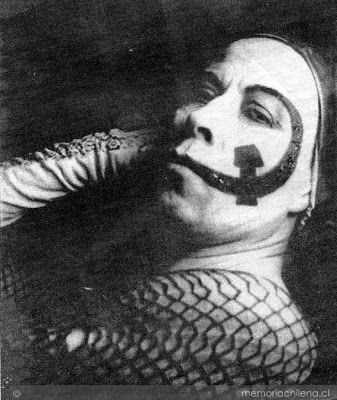Jairus Banaji
Pedro Lemebel (1952–2015), Chilean performance artist, writer and queer activist who was twice fired from his job as a high-school art teacher for openly identifying as gay. In the eighties, Lemebel created a performance troupe that would disrupt public events to dramatise issues of oppression. One of the most notorious of these public interventions occurred in 1986 when Chile was in the last years of Pinochet’s dictatorship, but it was an intervention aimed at breaking the culture of homophobia on the Left. The image shows Lemebel as he appeared during this intervention, interrupting a meeting of left-wing opposition parties.
“In high heels and make up depicting a hammer and sickle emerging from his mouth and extending to his left eyebrow, Lemebel denounced the homophobia of the Left in his ‘Manifesto: I Speak for my Difference’ to a bewildered, even hostile, audience perplexed at the cross-dressing revolutionary they had difficulty recognising as a figure of left-wing militant politics. Also marking his literary debut, the intervention staked out the space of marginality and difference that Lemebel unapologetically inhabited and rendered visible through his actions: “No soy un marica disfrazado de poeta / No necesito disfraz / Aquí está mi cara / Hablo por mi diferencia / Defiendo lo que soy / Y no soy tan raro” (I’m not a fag disguised as a poet / I don’t need a disguise / Here’s my face / I speak for my difference / I defend what I am / And I’m not that unusual).”
Born in an impoverished suburb of Santiago, Lemebel always identified with the poor and the marginal in Chile’s society, describing himself repeatedly as “maricón, pobre, indio y viejo” (a poor, old, indigenous fag). “The dictatorship targeted not only left-wing ‘subversives’”, Kate Averis writes, “but homosexuals, the indigenous, the indigent, and other identities deemed non-assimilable to a model of national identity of which the white, heterosexual, ‘masculine’ military men most closely approximated the ideal”.
In the nineties Lemebel went on to publish three Chronicles that were essentially collections of short texts depicting lives at the “social, political, sexual and ethnic margins he himself occupied”. Here, “Much like the reappropriation of ‘queer’ by queer activists and theorists, Lemebel reappropriates the homophobic language used in Chile to divest it of its derogatory tone by using it in self-designation”. It was the crime fiction writer Roberto Bolaño who eventually brought his work to audiences abroad by arranging to have it published in Spain. Lemebel died of cancer in 2015.
https://minorliteratures.com/2015/02/09/pedro-lemebel-farewell-to-a-queer-icon/
A translation of Manifesto is available here:http://cordite.org.au/poetry/notheme4/manifesto-i-speak-for-my-difference/

